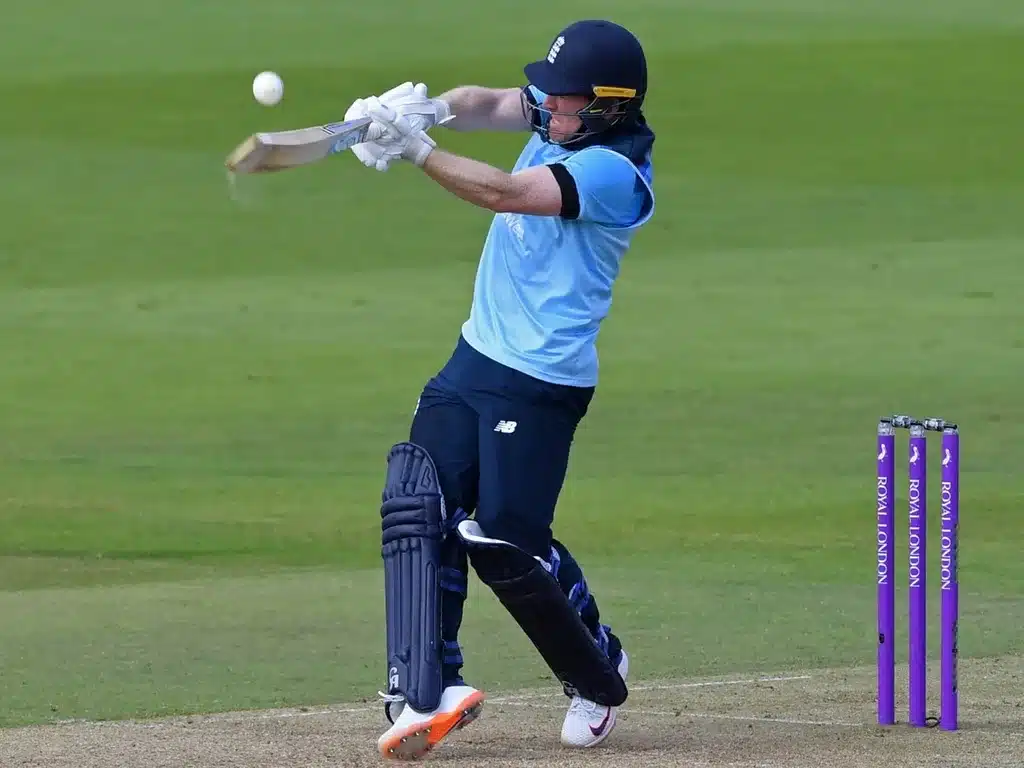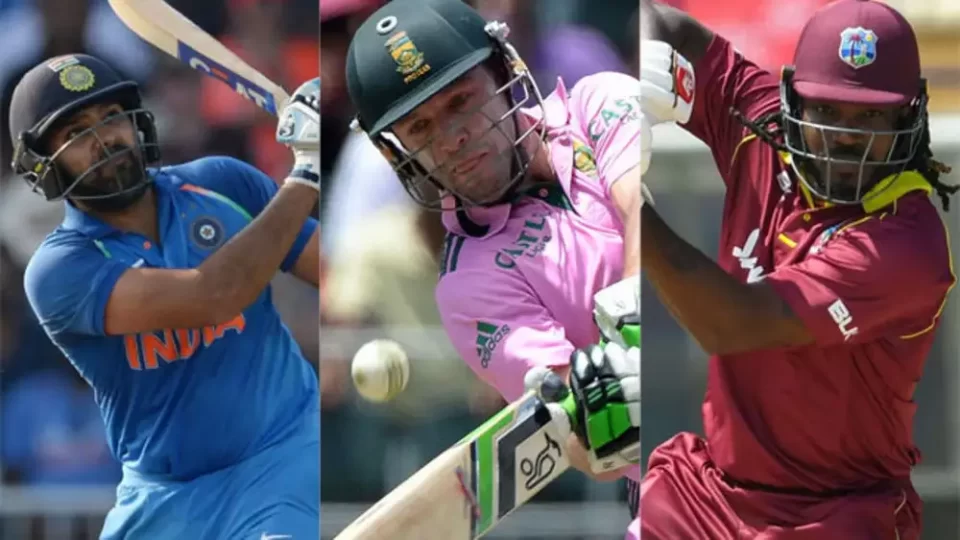In the ever-evolving world of cricket, a seismic shift has occurred in recent years. The game, once known for its nuances and strategies, has witnessed an explosive surge in the frequency of sixes. What was once a rare feat has become a commonplace spectacle, thanks to a confluence of factors reshaping the sport.
This transformation can be attributed to a perfect storm of shorter boundaries, flat tracks, and a seismic shift in batting strategies, with the influence of T20 cricket at its core. In this paradigm shift, the batsmen’s pursuit of sixes has taken center stage, with these towering hits increasingly punctuating the landscape of the game.
However, amidst this awe-inspiring display of power-hitting, a shadow looms over the bowlers. The challenges they face in limited-overs cricket have grown exponentially, leaving many to wonder whether the art of bowling can find a way to reclaim its lost ground in the face of this relentless six-hitting assault.
In this exploration, we delve into the factors behind the surge in sixes, the changing dynamics of the game, and the intriguing, albeit daunting, future that awaits bowlers as they strive to counter the six-hitting onslaught. Scoring sixes in cricket isn’t a skill every batsman possesses. Take Cheteshwar Pujara, for instance; he averages just one six per year. However, that’s no cause for concern, as he prefers to keep his shots grounded.
On the flip side, there are those who excel at clearing the boundary with ease. Eoin Morgan, the English captain, etched his name in ODI cricket history by smashing 17 sixes against Afghanistan during a 2019 World Cup match. Here’s a list of contemporary cricketers, akin to Eoin, who possess the remarkable ability to launch sixes whenever they wish.
Most Sixes in an ODI Innings
Here is the full list of most sixes in an ODI innings.
| Player Name | Sixes | Oppo. | Ground | Year |
|---|---|---|---|---|
| Eoin Morgan (ENG) | 17 | AFG | Manchester | 2019 |
| Rohit Sharma (IND) | 16 | AUS | Bengaluru | 2013 |
| AB de Villiers (SA) | 16 | WI | Johannesburg | 2015 |
| Chris Gayle (WI) | 16 | ZIM | Canberra | 2015 |
| Jaskaran Malhotra (USA) | 16 | PNG | Al Amerat | 2021 |
| Shane Watson (AUS) | 15 | BAN | Dhaka | 2011 |
| Corey Anderson (NZ) | 14 | WI | Queenstown | 2014 |
| Chris Gayle (WI) | 14 | ENG | St George’s | 2019 |
| Jos Buttler (ENG) | 14 | NED | Amstelveen | 2022 |
| Heinrich Klaasen (SA) | 13 | AUS | Centurion | 2023 |
| Thisara Perera (SL) | 13 | NZ | Mount Maunganui | 2019 |
| Xavier Marshall (WI) | 12 | CAN | King City | 2008 |
| Rohit Sharma (IND) | 12 | SL | Mohali | 2017 |
| Chris Gayle (WI) | 12 | ENG | Bridgetown | 2019 |
| Jos Butler (ENG) | 12 | WI | St George’s | 2019 |
Out of these 13 Innings, 12 have occurred since the year 2011. Notably, 5 of these occurrences took place in the early months of 2019 alone.
This trend underscores the evolution of six-hitting into a commonplace occurrence in contemporary cricket.
As an illustration, consider England’s performance in the 2015 World Cup when they collectively struck 18 sixes. Fast forward to the 2019 World Cup, and England blazed a trail by smashing 25 sixes in a single match against Afghanistan, exemplifying the changing landscape of power-hitting in the sport.
In Details:
Eoin Morgan, the English cricket captain, currently holds the record for the most sixes in a single One Day International (ODI) innings, a remarkable achievement that he accomplished during a 2019 World Cup game against Afghanistan. In that thrilling match, Morgan’s explosive innings of 148 runs included a staggering 17 sixes, setting a benchmark for power hitting.

Not to be outdone, Rohit Sharma, the Indian cricket sensation, showcased his six-hitting prowess by smashing 16 maximums in an innings where he reached the rare milestone of a double century, accumulating 209 runs against Australia.
AB De Villiers, the South African cricket maestro, etched his name in cricket history when he sent 16 deliveries soaring over the boundary against West Indies in Johannesburg. This incredible feat was part of his record-breaking innings, during which he scored the fastest hundred in ODI cricket. His final tally in that innings stood at 149 runs, which included 16 sixes and 9 fours.
The indomitable Chris Gayle, known for his colossal hitting, achieved a similar feat in a 2015 World Cup match against Zimbabwe. He pulverized the bowling attack with 16 mighty sixes on his way to his career-best score of 215 runs, showcasing his mastery in clearing the boundary ropes.
In a more recent and perhaps less-known record-breaking display, Jaskaran Malhotra of the USA made waves in September 2021. He unleashed a barrage of 16 sixes against Papua New Guinea, amassing a formidable score of 173 runs. This outstanding innings not only secured him the distinction of being the first USA batsman to notch a century in ODI cricket but also propelled him to the top of the ODI sixes chart for that year, reaffirming the global nature of power-hitting talent in modern cricket.
Overall Summary:
In summary, the surge in sixes in modern cricket represents a profound shift in the dynamics of the sport. Shorter boundaries, flat tracks, and the influence of T20 cricket have all contributed to the exponential increase in the frequency of sixes.
This transformation has turned power-hitting into an art form, with batsmen routinely clearing the boundary ropes from the very start of their innings. The allure of sixes has not only captivated fans but also reshaped the strategies and tactics of the game.
However, this evolution comes at a cost, particularly for bowlers who now face an uphill battle in the limited-overs formats. The relentless pursuit of boundary-clearing shots has left them grappling for effective strategies to stem the flow of runs.
As cricket continues to evolve, the equilibrium between bat and ball remains in flux. The surge in sixes is undeniably exciting, but it also raises questions about the sport’s balance. Ultimately, the future of cricket will hinge on how both batsmen and bowlers adapt to this ever-shifting landscape, ensuring that the game retains its essence and intrigue for generations to come.
Conclusion:
The combination of shorter boundaries and flat pitches is undeniably favoring batsmen, with sixes becoming a frequent sight right from the outset of their innings. Furthermore, the growing influence of T20 formats in cricket is further fueling this trend, as batsmen adapt to the art of power-hitting.
Regrettably, this spells a challenging outlook for bowlers in limited-overs cricket, and it appears that their struggles are likely to persist. The proliferation of sixes in modern cricket is a testament to the evolving nature of the sport. Shorter boundaries, batsmen’s adaptation to T20 formats, and the relentless pursuit of power-hitting have collectively reshaped the cricketing landscape.From following list chris gayle name is also comes in Top 10 Longest Six in Cricket History.
As the boundary ropes continually blur and the crowd’s appetite for sixes remains insatiable, bowlers find themselves in an uphill battle. The balance of power between bat and ball has tilted significantly, presenting a formidable challenge for those tasked with defending runs in limited-overs cricket.
While the surge in sixes has undeniably added excitement and flair to the game, it also raises questions about the equilibrium between bat and ball. As the sport continues to evolve, it remains to be seen whether bowlers can innovate and adapt, seeking new strategies to counter the relentless aerial assault and restore the equilibrium that has long defined the essence of cricket.


